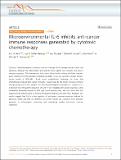Microenvironmental IL-6 inhibits anti-cancer immune responses generated by cytotoxic chemotherapy
Author(s)
Bent, Eric H; Millán-Barea, Luis R; Zhuang, Iris; Goulet, Daniel R; Fröse, Julia; Hemann, Michael T; ... Show more Show less
DownloadPublished version (823.5Kb)
Publisher with Creative Commons License
Publisher with Creative Commons License
Creative Commons Attribution
Terms of use
Metadata
Show full item recordAbstract
Cytotoxic chemotherapeutics primarily function through DNA damage-induced tumor cell apoptosis, although the inflammation provoked by these agents can stimulate anti-cancer immune responses. The mechanisms that control these distinct effects and limit immunogenic responses to DNA-damage mediated cell death in vivo are currently unclear. Using a mouse model of BCR-ABL+ B-cell acute lymphoblastic leukemia, we show that chemotherapy-induced anti-cancer immunity is suppressed by the tumor microenvironment through production of the cytokine IL-6. The chemotherapeutic doxorubicin is curative in IL-6-deficient mice through the induction of CD8+ T-cell-mediated anti-cancer responses, while moderately extending lifespan in wild type tumor-bearing mice. We also show that IL-6 suppresses the effectiveness of immune-checkpoint inhibition with anti-PD-L1 blockade. Our results suggest that IL-6 is a key regulator of anti-cancer immune responses induced by genotoxic stress and that its inhibition can switch cancer cell clearance from primarily apoptotic to immunogenic, promoting and maintaining durable anti-tumor immune responses.
Date issued
2021Department
Massachusetts Institute of Technology. Department of BiologyJournal
Nature Communications
Publisher
Springer Science and Business Media LLC
Citation
Bent, Eric H, Millán-Barea, Luis R, Zhuang, Iris, Goulet, Daniel R, Fröse, Julia et al. 2021. "Microenvironmental IL-6 inhibits anti-cancer immune responses generated by cytotoxic chemotherapy." Nature Communications, 12 (1).
Version: Final published version